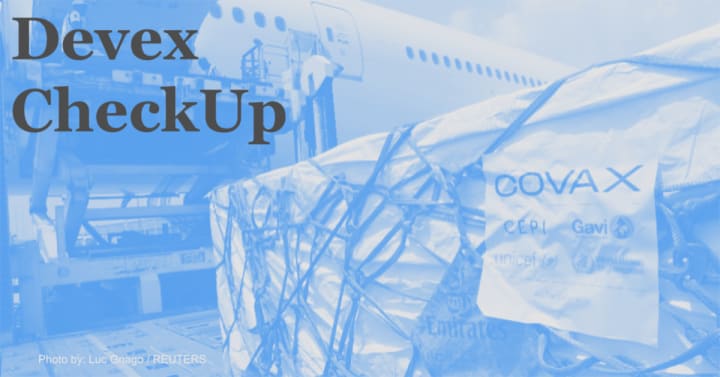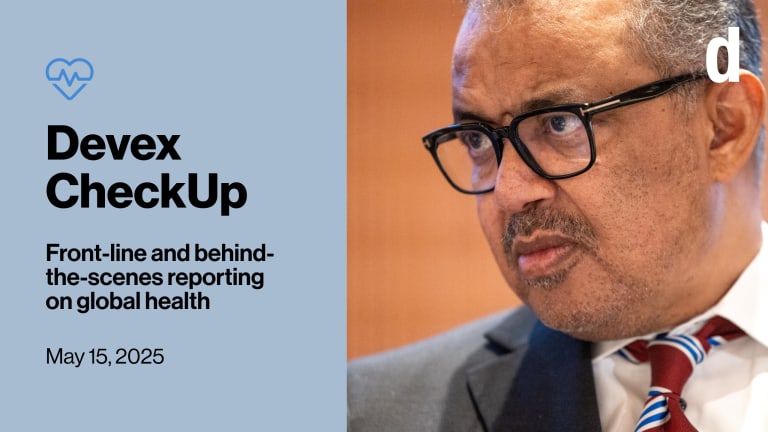
In 2021, sub-Saharan African countries accounted for about 95% of all malaria cases and 96% of malaria deaths. However, the continent has been reliant on imports of a key antimalarial drug used to prevent infection in children and pregnant women.
But last week, Universal Corporation Ltd., a Kenyan pharmaceutical company, became the first African manufacturer to receive WHO prequalification for sulfadoxine-pyrimethamine or SP. WHO’s nod helps guarantee the drug’s safety, efficacy, and quality, and also means that now the supply of the drug — which has been in use for decades — could come from the continent where it is most needed.
This is a preview of Devex CheckUp
Sign up to this newsletter for exclusive global health news and insider insights, in your inbox every Thursday.
• Manufacturers of SP are limited, and many countries in sub-Saharan Africa have experienced shortages of the drug, according to the Medicines for Malaria Venture. This is due to the drug’s low sale price and limited market size — it’s used among children and pregnant women, but current programs don’t reach many of them.
• The drug is used in several malaria prevention programs and has a reputation as both inexpensive and effective, Unitaid’s Hervé Verhoosel tells Jenny. But it’s harder to depend on because supply has been inadequate and unstable due to reliance on imports. Unitaid is currently funding a project meant to generate evidence that will help implementers scale-up providing the drug as prevention to children and babies in regions where malaria is a year-round problem.
• Apart from addressing supply issues, experts see the WHO prequalification as increasing quality-assured SP in Africa, and ensuring labeling that makes clear the drug is only to be used as a preventative and only in certain populations, which isn’t always clear in products currently on the market.
• The question of funding remains. Countries still need to adopt the product, raise the money, and buy SP from its African manufacturer. A key benefit of a WHO prequalification is that it makes the drug eligible for procurement by international organizations, such as the Global Fund to Fight AIDS, Tuberculosis and Malaria.
Read: The significance of the first WHO-approved African malaria medicine
Luxury living
A recent report examining access to COVID-19 tools in 14 countries and territories found that health workers from Nigeria, Madagascar, and Haiti have never heard of novel antiviral treatments for COVID-19, including Paxlovid. Other countries studied, such as Peru and Jamaica, have not yet approved Paxlovid for use — and in others such as Somalia, supplies were significantly limited.
In most countries, access has been limited to the rich, says Ali Mokdad, professor of global health at the Institute for Health Metrics and Evaluation. “They have somebody in the U.S. or somebody in Europe, in the U.K., or in France, and they send the money … and it will be bought for them and shipped to Lebanon the next day. That's not true for the majority,” he tells Jenny.
Meanwhile, ACT-A partners have started deliveries of molnupiravir — another oral COVID-19 antiviral developed by Merck, Ridgeback Biotherapeutics, and Emory University. Earlier this year, we published a look at the potential for a treatment gap, with molnupiravir being shunted to low-income countries while Paxlovid remains far less accessible.
Read: Why Paxlovid is still not available in many LMICs
‘Facing a catastrophe’
In a new series for Pro members, we examine how global development organizations are responding to the food crisis. This week, Assumpta Ndumi, the East Africa technical adviser for nutrition at the International Rescue Committee, explains the organization’s simplified process for treating wasting as it responds to a surge in hospital admissions for child malnutrition in the region.
With ready-to-use therapeutic foods in short supply, kids are being given two sachets per day — as opposed to what might previously have been three or four, in a process calculated to the child’s weight.
Ndumi says IRC’s clinics are seeing huge increases in child malnutrition, with admissions in one refugee camp in Kenya increasing threefold.
Q&A: IRC simplifies wasting treatment as child malnutrition surges (Pro)
+ Devex Pro members can also read about the United Nations hub carrying on the Food Systems Summit agenda. Not gone Pro yet? Start your 15-day free trial today.
The great deluge
Upcoming events
ZIMBABWE
WHO @ IUSTI 2022
Sept. 4-7
ITALY
IFPA Forum
Sept. 5
ONLINE
Devex @ UNGA 77
Sept. 21-22
ONLINE
Talking TB: The road to 2030
Sept. 22
WHO has declared the flooding in Pakistan a grade 3 emergency — its highest level — meaning country offices, regional offices, and headquarters are all working on the response, Director-General Tedros Adhanom Ghebreyesus said Wednesday.
Thirty-three million people — including approximately 16 million children — have been affected by the monsoon floods so far. The agency has released $10 million from the WHO Contingency Fund for Emergencies to support “work to treat the injured, deliver supplies to health facilities, and prevent the spread of infectious diseases.”
Meanwhile, UNICEF has warned that more than three million children are in need of humanitarian assistance and at increased risk of waterborne diseases, drowning, and malnutrition.
Same mistakes
“COVID-19 vaccines … followed the available money instead of where the need was most acute. We are seeing the same pattern now with monkeypox vaccines.”
— Dennis Carroll, senior adviser for global health security, University Research Co. LLCCarroll, who directed the influenza pandemic and other emerging threats units at USAID for more than a decade, decries the failure to create an early warning surveillance system in a post-COVID-19 world. In an op-ed for Devex, he worries that instead of preparing for future outbreaks, the world will simply “wait blindly” — and be caught off guard again.
Opinion: Monkeypox and global health security — will we ever learn?
ICYMI: Is monkeypox an emergency except when it's in Africa?
What we’re reading
AstraZeneca is weighing whether to continue in the vaccine business. [Reuters]
Health officials have reported the first death of a person with monkeypox in the U.S. [STAT]
COVAX will deliver 10 million COVID-19 vaccine doses to Mexico by the end of September after President Andrés Manuel López Obrador vowed to complain about shipment delays. [Reuters]






